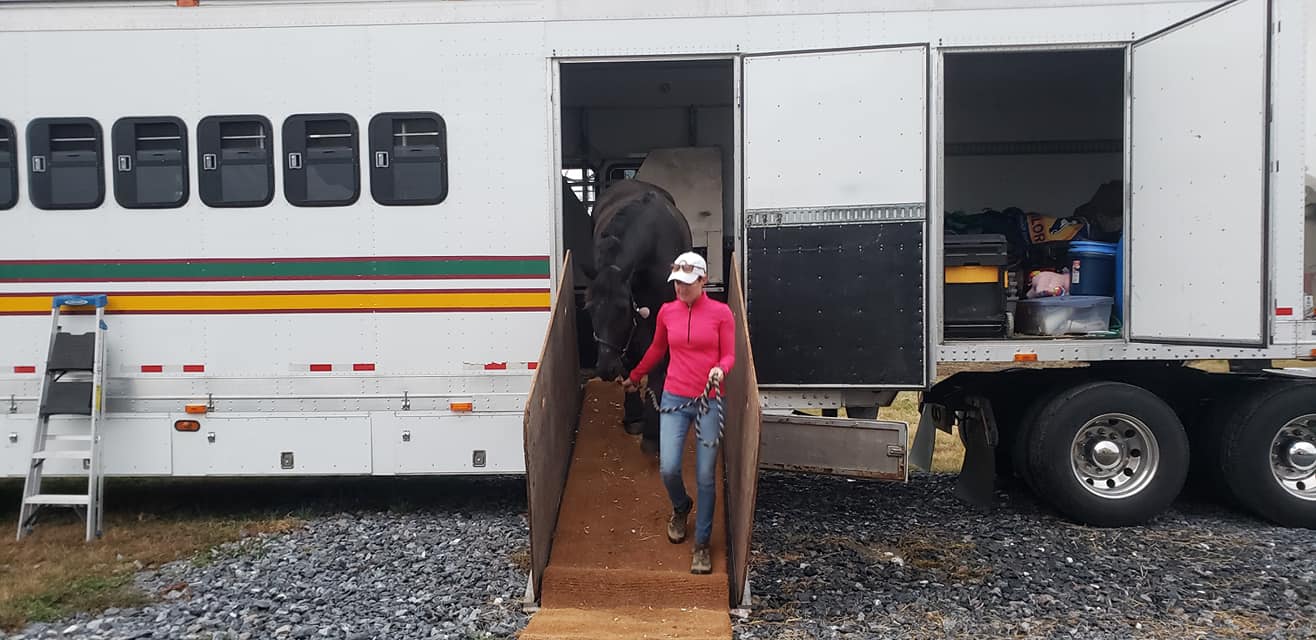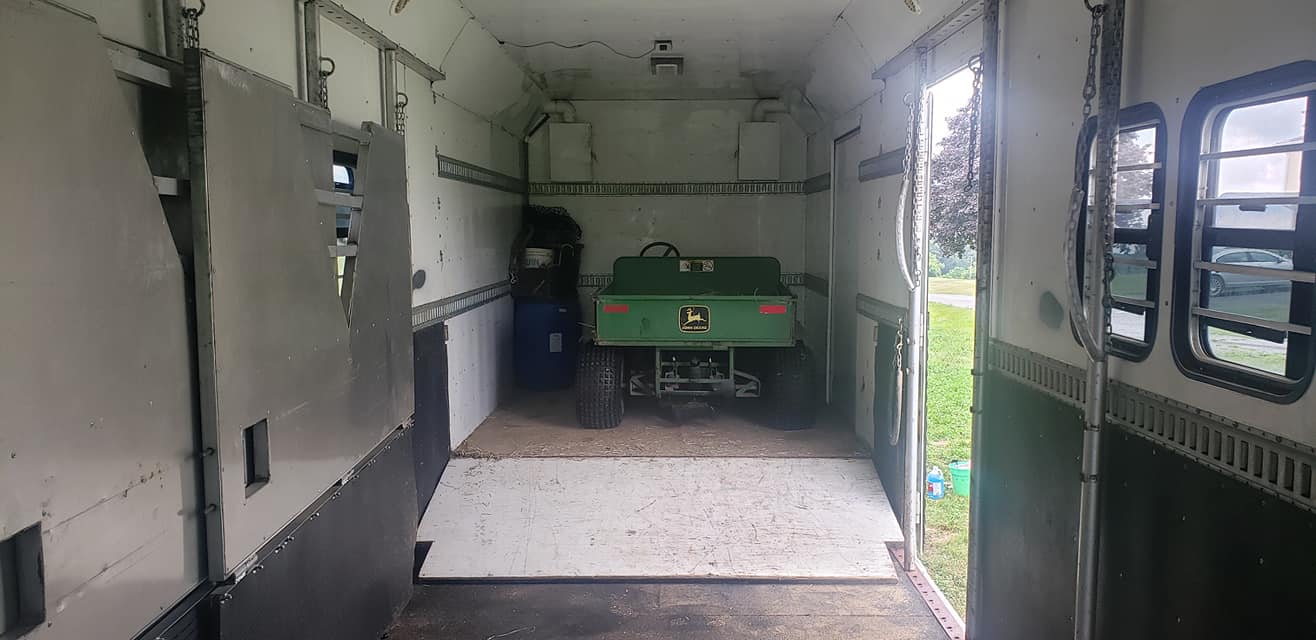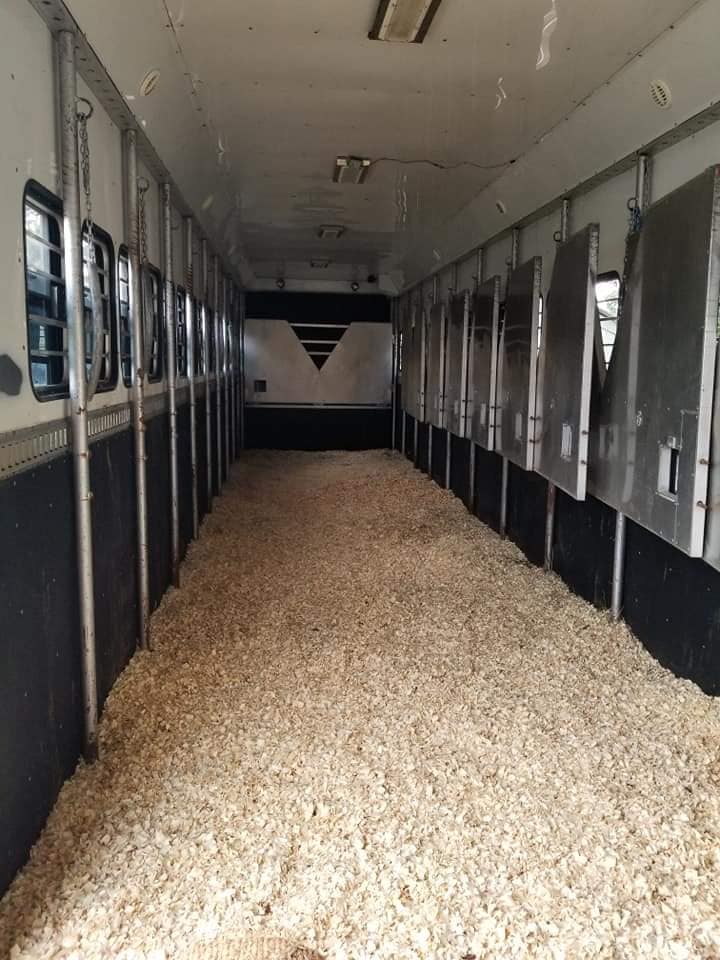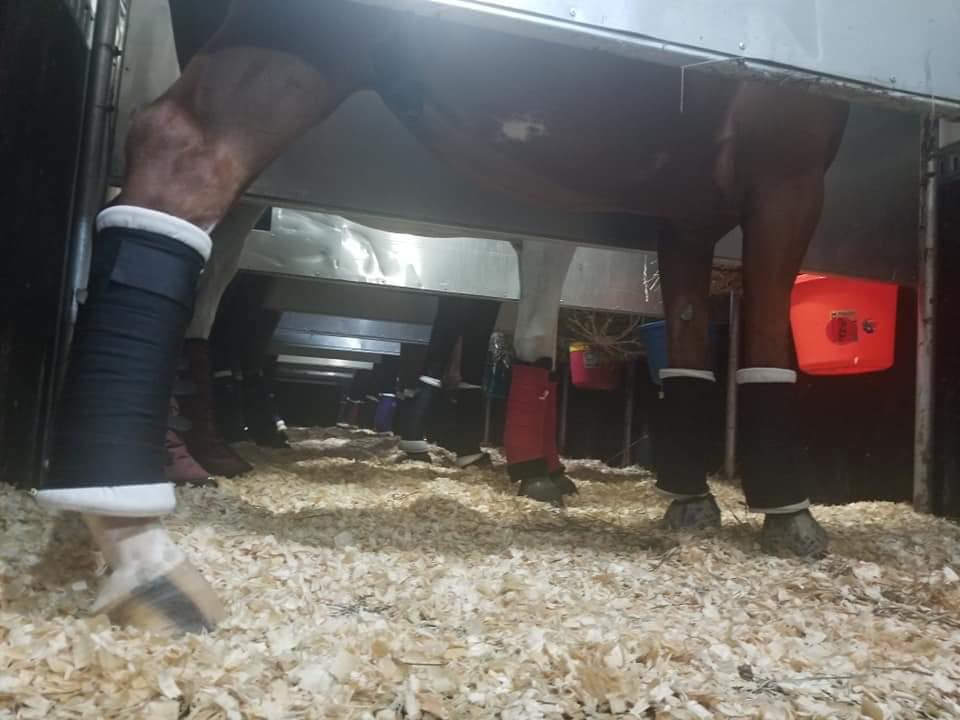As you’re preparing to ship your horse south for the winter, there are several things you’ll want to do ahead of time to ensure a smooth trip. Photo courtesy of Isola Shipping.
Now is the time of year when many equestrians around the country are preparing for the upcoming winter show season. For many of us, that means shipping to a warmer climate (Wellington or Ocala, for example), often several hours from our home base. Our team has been making this journey for years, and over time we’ve developed a system to keep horses healthy, safe, and stress-free during their trip. We also own and operate a professional shipping company, so we’ve dealt with just about any type of situation a shipper can encounter.
Here are a few things to keep in mind when you’re planning to have a professional ship your horse.
Research ahead of time
When deciding on a shipping company, be sure to ask plenty of questions about the company, the rig in which your horse will be traveling, and any health and safety policies they have.
One of the most important questions you’ll want to ask is if the shipping company is fully licensed and insured. Ask around to friends and professionals in the industry to get any insight on the company’s reputation. With your horse’s life at stake, you’ll want to make sure he’s in the care of a reputable, experienced carrier during his trip. Also, keep in mind that you get what you pay for. Shipping a horse can be expensive, but you don’t always want to shop around for the cheapest prices if that means skimping on his care or safety.
Other important questions to ask are how often the shipper will stay in contact with you during the trip, and what will they do if your horse has a medical emergency. Make sure they have all the necessary contact information they need for both you and your veterinarian.
Ask about additional safety and comfort features
In our own rig we’ve outfitted video monitoring in order to keep a close eye on the horses during travel. That way if there’s a problem, we’ll be alerted right away.
Another option that many owners ask about are box stalls. Some horses ship more comfortably for longer trips in box stalls where they’re able to safely travel without being tied and have the option to move around or even lie down. It’s typically more expensive, but it’s worth the extra money if it keeps your horse happy and stress-free during his journey.
Inquire about storage capabilities
Be sure to ask your shipper if there will be extra room for some of your necessary equipment and extra feed and hay that you’ll need to bring as well. Photo courtesy of Isola Shipping.
If you’re planning to stay south for at least a few months, there’s a good chance that you’ll need to bring your barn supplies with you. Most shippers will transport equipment you plan to bring such as tack trunks, wheelbarrows, extra hay and feed, or even a golf cart or ATV if you have one.
Be sure to label everything, especially if the trip includes horses from other barns. You don’t want to arrive at your destination and discover that some of your crucial supplies have ended up elsewhere.
Avoid contamination
A clean, ventilated and well-sanitized interior is crucial for helping to keep your horse healthy during his journey. Photo courtesy of Isola Shipping.
Because of the stresses of traveling, especially to a new climate, horses can easily become ill during shipping. Therefore, we take cleanliness very seriously in our company in order to give horses optimal conditions for their journey and lower the risk of any potential health problems. After each load, our trailer is stripped, power-washed, and disinfected with hospital-grade disinfectant and we do a thorough inspection of the rig as well.
Get your paperwork done early
Your horse must possess an up-to-date negative Coggins and a current (within 30 days) health certificate from a veterinarian ensuring your horse has all his necessary vaccinations and displays no symptoms of infectious illness at the time of his examination. Don’t wait for the last minute, because these are must-haves for any horse who will be traveling.
Also, talk with your equine insurance company and make sure your horse is up to date on his policy. He will likely be covered, at least in part, by the shipper’s policy, but it’s worth chatting with your provider to make sure you understand all of the risks ahead of time.
Consider leg protection
If you’re just doing a day trip, you should probably wrap or provide shipping boots for your horse. But for trips beyond 12 hours, you might want to skip it, advises John Michael Durr. Photo courtesy of Isola Shipping.
When most of us ship our horses, we often include some type of leg protection for them – whether it’s shipping wraps or boots. However, for trips longer than twelve hours I personally will not put anything on my horses’ legs. There’s a greater chance of a boot or bandage sliding down or coming undone during a long journey, and it will be more stressful for the shipper to try and fix this issue for you. Plus, a situation like this could potentially cause your horse stress and discomfort or even injury.
Wait to clip
Deciding whether or not to clip your horse ahead of time can be tricky. Often, I’ll advise clients to wait and clip until they arrive at their destination. That way the shipper won’t have to worry about swapping a horse’s blankets around to keep him comfortable.
Address feeding and watering concerns
 Don’t be afraid to ask your shipper plenty of questions about their policies and how they care for horses during trips. Photo courtesy of Isola Shipping.
Don’t be afraid to ask your shipper plenty of questions about their policies and how they care for horses during trips. Photo courtesy of Isola Shipping.
Sometimes we’ll have a horse who doesn’t typically drink during shipping or travels poorly. In that case, we’ll have the veterinarian out a day or so ahead of time to give the horse fluids to help ensure they stay hydrated during the trip. However, that’s typically only for trips that are more than a day’s drive. We always keep their hay bags full and water buckets in front of them at all times, so fortunately we don’t often have many issues.
Also, be sure to ask your shipper how often they stop to re-fill hay bags and water buckets and check on the horses.
Protect their gut health
Shipping can be stressful on a horse’s gastric system, so chat with your veterinarian about an ulcer prevention regimen. We usually start our own horses on a regimen two or three nights ahead of departure time, depending on each horse. There are many different types of products available on the market, with Gastrogard and Ulcergard being some of the most commonly used.
Be organized
Organizing all of your necessary supplies ahead of time will save you a lot of stress when your horse arrives at his destination. Put the most needed items near the top of your trunks so you get to them quickly and won’t have to dig to find something in an emergency situation. Make sure you can easily access any medical supplies and consider doubling up on equipment that is often lost or broken. Invest in extra breakaway halters, lead ropes, double-ended snaps, and things of that nature. And don’t forget to label everything!
If you ask your potential shipper all the necessary questions and do plenty of research, preparation, and organization ahead of time, you’ll have the best chance for a smooth, stress-free trip for your horse.
About John Michael Durr
John Michael Durr draws from deep and diverse experience to craft tailored tools for horses and riders of all levels. Through clinics, lessons, tune-ups, and virtual consultations, he teaches riders practical and personalized skills that open a path for clear communication and mutual respect with their equine partners.
Throughout a decade of top results competing at the highest levels of three-day eventing, show jumping, dressage, and show hunters, he’s distilled the best advice from top mentors such as Lilo Fore, Capt. Mark Phillips, and Yves Sauvignon. When he achieved his Level-4 ICP certification in 2014, he was the youngest to do so at the time. As an FEI Eventing Level-2 Course Designer, he’s earned an exclusive perspective that has helped horses and riders safely and successfully navigate the questions at every level of competition.
John Michael also owns and operates Isola Shipping, in partnership with David Taylor of Elevation Dressage & Eventing. Isola Shipping is a unique horse transportation company that combines quality safe transportation with those who know high-performance horses firsthand.
This story was edited by Emily Daily/Athletux. To learn more about this equestrian marketing firm, visit www.Athletux.com or follow along on social media via Facebook or Instagram.




